|
|
|
Sort Order |
|
|
|
Items / Page
|
|
|
|
|
|
|
| Srl | Item |
| 1 |
ID:
128430
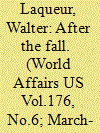

|
|
|
|
|
| Publication |
2014.
|
| Summary/Abstract |
As the Soviet Union disintegrated, ending on the ash heap of history in 1989-91, all the institutes for the study of Marxism-Leninism that had justified the regime, the collected and selected works of the communist classics, and the Marxism chairs in academies and universities also disappeared. From this void emerged a burning question: What was the raison d'être of the existing political system? And later, how did the new regime justify itself in the field of foreign and domestic affairs, and what was its social and economic policy? For the answers, Vladimir Putin and his followers went back to the future. Russia's official ideology prior to 1917 was Pravoslavie, Samoderzhavie,Narodnost, which has been translated as Orthodoxy, Autocracy, Nationality. This statement was made first by Sergei Uvarov, the Russian minister of education, in a circular letter in 1833. Uvarov was a learned man who also served as president of the Russian Academy of Sciences. No one had asked Uvarov to prepare such an official binding declaration. However, Czar Nicholas I liked this "triad," as it was called, even though its meaning was by no means always clear.
|
|
|
|
|
|
|
|
|
|
|
|
|
|
|
|
| 2 |
ID:
129442
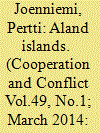

|
|
|
|
|
| Publication |
2014.
|
| Summary/Abstract |
The Åland Islands received their co-sovereign standing from the League of Nations in 1921, the settlement of a Finnish-Swedish dispute. The clash was over ownership, and the league advocated that Åland should remain part of Finland, albeit elevated to the status of a self-governing polity. The verdict implied that Finland's sovereignty was significantly compromised, whereas the islands landed in an in-between situation, being neither local nor fully sovereign. The duality of Åland - remaining an integral part of Finland yet still distinct with a standing of its own, including various cultural and linguistic safeguards - meant more generally that the islands fall through the interstices of the dominant discourses pertaining to political space. However, the lack of any clear conceptual standing has not amounted to anything profoundly disadvantageous. Their liminal nature of being neither this nor that has instead furnished the islands with a rather favourable posture. Their standing, although initially perceived as a loss and still seen in some interventions as unwarranted and viewed as a source of ontological uncertainty, arguably accounts for their ability to transform what usually appears as weakness into a considerable degree of influence. The article thus aims to explore what explains such an outcome and the manner in which the ambiguity of the islands has stood the test of time, taking into account that their standing has, among other things, been impacted by Finland and the islands both joining the EU in 1995 and the sovereignty games involved.
|
|
|
|
|
|
|
|
|
|
|
|
|
|
|
|
| 3 |
ID:
132417
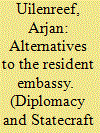

|
|
|
|
|
| Publication |
2014.
|
| Summary/Abstract |
Increasingly integrated in a common political entity, the European Union's member states are exploring new avenues to shape and maintain their mutual relations. This analysis describes three alternatives to the traditional resident embassy by which ministries of foreign affairs within the EU attempt to maintain diplomatic networks. The models discussed are secondments within member states' capitals, visiting ambassadors, and co-location and co-operation. In other words, with regard to different modes of representation, member states can consider diving in, stepping back, or pooling and sharing. These developments shed light on the ways in which the diplomatic machineries of the member states are trying to adapt to the demands of a "post-Westphalian" environment such as that of the EU.
|
|
|
|
|
|
|
|
|
|
|
|
|
|
|
|
| 4 |
ID:
076726
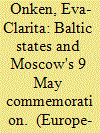

|
|
|
|
|
| Publication |
2007.
|
| Summary/Abstract |
This article develops a three-level framework for analysing the role of memory in contemporary European politics. It tests the utility of this framework based on the three Baltic states and their public and political debates around the World War II anniversary commemorations in Moscow in 2005. Existing concepts for analysing the impact of memory on policy decisions are discussed first on the levels of domestic politics and bilateral relations. The article then provides a framework for researching a lesser acknowledged third level of memory politics within European institutions. The dilemma felt by the three Baltic presidents over whether or not to attend the Moscow ceremonies provides a unique opportunity to look at all three levels and demonstrate their relevance for understanding future memory struggles in an enlarged Europe.
|
|
|
|
|
|
|
|
|
|
|
|
|
|
|
|
| 5 |
ID:
173224
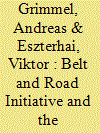

|
|
|
|
|
| Summary/Abstract |
This article examines how states may be inclined to adapt to the policy goals of powerful economic partner states in acts of ‘anticipatory conformity’ or by adjusting their ‘common’ policy goals. It builds on two classical theoretical bases—the concept of economic statecraft and Hirschmanesque effects—to explore how economic power may be translated into far-reaching effects on other states’ behaviour without a clear goal or objective being proclaimed or even set by the economically powerful state. Our empirical findings suggest that the European Union still has an unparalleled influence on member states, and China’s growing economic presence in Europe alone—especially in the framework of the Belt and Road Initiative—is insufficient to influence member states’ politics.
|
|
|
|
|
|
|
|
|
|
|
|
|
|
|
|
| 6 |
ID:
134088


|
|
|
|
|
| Publication |
2014.
|
| Summary/Abstract |
One reason why Europe went to war in 1914 is that all of the continental great powers judged it a favorable moment for them to fight, and all were more pessimistic about postponing the fight until later. Not only is this historical paradox an interesting puzzle in its own right, but it sheds light on what is arguably the reigning theory of the causes of wars in general: James Fearon's rational bargaining theory. None of Fearon's three main mechanisms-private information, commitment problems, or indivisibility of stakes-can explain the paradox of the universal, simultaneous view of 1914 as a favorable year for war. Two mechanisms that play a marginal role in his analysis, however-bounded rationality in multidimensional power assessments and attempts to mitigate power shifts through coercive diplomacy-help to explain how Europe's powers became trapped in a choice between war now and war later. These mechanisms were set in motion by background strategic assumptions rooted in the culture of militarism and nationalism that perversely structured the options facing Europe's political leaders in 1914. Whereas Fearon's theory assumes that states are paying equal attention to all relevant information, in 1914 each power's strategic calculations produced disproportionate levels of self-absorption in its own domestic concerns and alliance anxieties.
|
|
|
|
|
|
|
|
|
|
|
|
|
|
|
|
| 7 |
ID:
171814
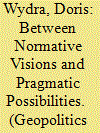

|
|
|
|
|
| Summary/Abstract |
During the last decades the map of Europe has changed considerably. New claims for independent statehood were brought forward and demanded for recognition. These claims had to be answered by the European Union and its member states. This article evolves around the idea that state recognition is as much a matter of politics as it is of law. It starts from the assumption that ‘who we are defines what we see’, claiming, that EUropean identity, the images the EU and the member states hold about themselves, shape the mental maps they hold of territories and space. Building on this identity a geopolitical imaginary is formed, which can be defined as ideas, allowing actors to ascribe meaning to territories, establish order in a seemingly chaotic world by means of classification and categorisation and allow to develop strategies for action. The geopolitical imaginary of EUrope contains the vision, that if all states were more like EUrope itself, the world would be a better place: a world determined not by power and coercion, but by rules, norms and values; with conflict mechanisms, not based on the rule of the strongest, but the rule of law; stability, created through common rules, negotiation and economic prosperity; and a determination not to let ‘blunt power-politics’ prevail. This imaginary shapes the way in which Europe makes meaning of claims for statehood and decides which claims to recognise as legitimate. The different elements of the imaginary sometimes contradict each other: law may have to take the back seat in the quest for stability or justice. Law is open to creative interpretations to allow the ‘right’ claims for recognition to prevail and the ‘wrong’ ones to be rejected The tool of recognition is caught between legal arguments and political considerations, between normative visions and pragmatic possibilities.
|
|
|
|
|
|
|
|
|
|
|
|
|
|
|
|
| 8 |
ID:
129205
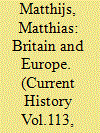

|
|
|
|
|
| Publication |
2014.
|
| Summary/Abstract |
After a tumultuous professional marriage of just over 40 years, Britain and Europe are facing the possibility of divorce. In January 2013, Prime Minister David Cameron decided to celebrate Britain's 40th anniversary as a member of the European Union by pledging a fundamental renegotiation of his country's terms of membership. Cameron further promised to submit any renegotiated deal to a clear "in-or-out" referendum in 2017 on whether or not to leave the EU, assuming his own Conservative Party wins a majority in the next general election in May 2015. Egged on by his party's growing ranks of restive Euroskeptics and trying to fight off a challenge on his right flank from populist Nigel Farage's UK Independence Party (UKIP), Cameron rolled the dice. He hoped to settle once and for all the Europe question, which has so often cast a dark shadow over the political debate in Westminster and Whitehall. Renegotiating
|
|
|
|
|
|
|
|
|
|
|
|
|
|
|
|
| 9 |
ID:
132082
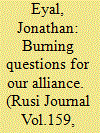

|
|
|
|
|
| Publication |
2014.
|
| Summary/Abstract |
Russia's annexation of Crimea and its actions in eastern Ukraine have led to a fundamental shift in Europe's security environment. Jonathan Eyal argues that NATO will have to find a way to reassure its Eastern European members without repudiating existing structures for co-operation with Russia.
|
|
|
|
|
|
|
|
|
|
|
|
|
|
|
|
| 10 |
ID:
125218
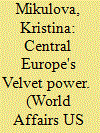

|
|
|
|
|
| Publication |
2013.
|
| Summary/Abstract |
Central Europe used to be a place of tragedy, according to Czech novelist Milan Kundera, a leading dissident voice during the communist era. Throughout its troubled history, the region, fatefully wedged between Germany and Russia, suffered deep wounds to its psyche at the hand of great powers: oppression by enemies, betrayal by friends. Its battered societies were so busy trying to survive, Kundera mused, that they did not have the leisure to look inward and focus on themselves.
|
|
|
|
|
|
|
|
|
|
|
|
|
|
|
|
| 11 |
ID:
110301
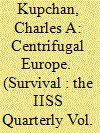

|
|
|
|
|
| Publication |
2012.
|
| Summary/Abstract |
The project of European integration is experiencing its gravest political crisis to date. Ongoing debate about how to restore the financial stability of the eurozone has exposed deep rifts within the EU, calling into question the solidarity that is the hallmark of political union. At stake is the survival not just of the euro, but the EU itself.
The EU's debt crisis poses a particularly potent threat to the project of European integration because it is both a consequence and a cause of a more serious malady: the renationalisation of European politics. Confronted with the powerful intrusions of both European integration and globalisation, electorates in EU member states have for the better part of a decade staged a mounting revolt against Brussels and its supranational brand of governance. Unwanted immigration, growing inequality, fraying welfare states, stagnant wages, bailout and austerity packages - these developments have produced a wave of popular discontent, which is in turn exacting a heavy toll on the EU as angry voters press for the repatriation of political control and the restoration of national autonomy.
|
|
|
|
|
|
|
|
|
|
|
|
|
|
|
|
| 12 |
ID:
128994
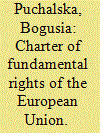

|
|
|
|
|
| Publication |
2014.
|
| Summary/Abstract |
The proclamation of the Charter for Fundamental Rights of the European Union, in December 2000 at Nice, France, followed by its inclusion within the failed Constitutional Treaty and its current status as a legally binding document under the Treaty of Lisbon, charts the changing fortunes of European Union politics dealing with fundamental rights protection. This article outlines the main rationales and hopes behind the enactment of the Charter and notes that through the process of political conditionality it may have been devalued from its very conception. The article suggests that, following their accession, Poland, and later the Czech Republic, used the Charter and Lisbon Treaty negotiations, including their opt-outs from the Charter, to engage in a game of power politics that had both domestic and European undertones. This politics of power game-play reflected a need by both states, and Poland in particular, to respond to both the political conditionality that they had been required to sign up to as part of the accession process and to emphasise how membership had improved their negotiating power. The article suggests that the consequence of this action by both states has not only further devalued the Charter but potentially undermined the rights of Polish and Czech citizens.
|
|
|
|
|
|
|
|
|
|
|
|
|
|
|
|
| 13 |
ID:
134066
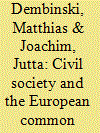

|
|
|
|
|
| Publication |
2014.
|
| Summary/Abstract |
The involvement of civil society organizations (CSOs) is widely regarded by students of the EU's domestic policy fields as enhancing transparency and accountability and, more generally, the democratic quality of political processes. This article explores the contribution of CSOs to the EU's Common Security and Defence Policy and assesses whether a democracy-enhancing effect of their involvement can also be demonstrated for this policy field. We analyse the contribution of CSOs based on two common models of democracy: the intergovernmental and the supranational model of democracy. We find that CSOs are indeed quite actively involved in the EU's security policy. With regard to their democracy-enhancing effects, however, our findings are rather mixed. While the engagement of CSOs does provide a remedy for the democratic deficits associated with intergovernmental decision-making, these organizations do not fully meet the demands posed by supranational governance.
|
|
|
|
|
|
|
|
|
|
|
|
|
|
|
|
| 14 |
ID:
047145
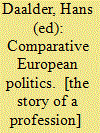

|
|
|
|
|
| Publication |
London, Pinter, 1999.
|
| Description |
iv, 377p.
|
| Standard Number |
1855676078
|
|
|
|
|
|
|
|
|
|
|
|
Copies: C:1/I:0,R:0,Q:0
Circulation
| Accession# | Call# | Current Location | Status | Policy | Location |
| 044669 | 320.094/DAA 044669 | Main | On Shelf | General | |
|
|
|
|
| 15 |
ID:
132939
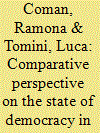

|
|
|
|
|
| Publication |
2014.
|
| Summary/Abstract |
The scholarship on Central and Eastern European politicsand societies is well established in the literature. Over the past two decades, scholars have addressed a variety of topics including the role of civil society in transition and democratic consolidation (Linz & Stepan 1996a, 1996b; P?ibá? & Young 1999; Pridham 2001; Pollack & Wielgohs 2004); the process of institution-building and the functioning of institutions (Karp 1994; Zielonka 2001; Malova & Haughton 2002); the development of political parties and their contribution to democracy (Kitschelt 1992; De Waele 1999; Lewis 2001, 2008; Hough 2005; Deegan-Krause & Haughton 2010; Burnell & Gerrits 2010); the role of external actors in the process of consolidation of democracy, and in particular the role of the EU and the enlargement process (Papadimitriou 2002; Dimitrova 2004; Schimmelfennig & Sedelmeier 2005; Vachudova 2005; Epstein & Sedelmeier 2009; Morlino & Sadurski 2010; O'Brennan 2011); populist parties (Mudde 2007; De Waele & Pacze?niak 2010; Pankowski 2011) and the ambiguous role of nationalism (Latawski 1994; Auer 2004); the problem of the rights of ethnic, linguistic, religious and national minorities (Taras 1998; Rechel 2009); the relationship between justice and politics (Anderson et al.2005; Coman & De Waele 2007; Coman 2009; Piana 2010); the construction of a market economy and the relationship between democracy and economic policies (Jeffries 1996; Stark & Bruszt 1998; Hasselman 2006; Myant & Drahokoupil 2010); political cultures (Pollack 2003; Klingemann 2008); the problems related to corruption (Smilov & Toplak 2007; Schmidt-Pfister & Moroff 2012); and the development of regionalisation and the role of local governments (Hughes et al.2004a, 2004b; Coulson & Campbell 2007).
|
|
|
|
|
|
|
|
|
|
|
|
|
|
|
|
| 16 |
ID:
130892
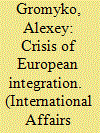

|
|
|
|
|
| Publication |
2014.
|
| Summary/Abstract |
Today, multipolarity and polycentrism are quantitatively and qualitatively different from their "prototypes" of historical periods of the past. Here it is necessary to single out three moments. First, Euro-centrism has been fading away in the past 20 years. Up to the 20th century, all the "concerts of powers" were based on the leading role of European states in international relations. Secondly, this new polycentrism is moving away from the straightforward dominance of the principle of force. The third moment, which characterizes the new-style multipolarity, is a phenomenon of international law that we have inherited from the 20th century.
|
|
|
|
|
|
|
|
|
|
|
|
|
|
|
|
| 17 |
ID:
133033
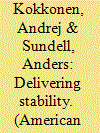

|
|
|
|
|
| Publication |
2014.
|
| Summary/Abstract |
Building a strong autocratic state requires stability in ruler-elite relations. From this perspective the absence of a successor is problematic, as the elite have few incentives to remain loyal if the autocrat cannot reward them for their loyalty after his death. However, an appointed successor has both the capacity and the motive to challenge the autocrat. We argue that a succession based on primogeniture solves the dilemma, by providing the regime with a successor who can afford to wait to inherit the throne peacefully. We test our hypothesis on a dataset covering 961 monarchs ruling 42 European states between 1000 and 1800, and show that fewer monarchs were deposed in states practicing primogeniture than in states practicing alternative succession orders. A similar pattern persists in the world's remaining absolute monarchies. Primogeniture also contributed to building strong states: In 1801 all European monarchies had adopted primogeniture or succumbed to foreign enemies.
|
|
|
|
|
|
|
|
|
|
|
|
|
|
|
|
| 18 |
ID:
091436
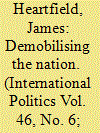

|
|
|
|
|
| Publication |
2009.
|
| Summary/Abstract |
Sovereignty is the subject of considerable debate in both International Relations (IR) theory and European Union (EU) studies. In IR, debate is oriented around the extent to which sovereignty constitutes the building block - or generative grammar - of international order. In EU studies, inter-governmentalists and integrationalists differ over how, why and to what extent European states are pooling or derogating sovereignty to supra-national institutions. This article makes no claim to resolving these debates. Rather, it works within them in order to examine the ways in which the exercise of sovereignty is becoming increasingly problematic, particularly in Western Europe. Specifically, it is argued, because of the failure of domestic political processes, European states are frustrated in terms of their international actions. This diminution of sovereignty provides the integration process with a veneer of dynamism as European institutions fill the vacuum left by demobilising nation-states.
|
|
|
|
|
|
|
|
|
|
|
|
|
|
|
|
| 19 |
ID:
127820
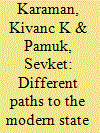

|
|
|
|
|
| Publication |
2013.
|
| Summary/Abstract |
Theoretical work on taxation and state-building borrows heavily from early modern European experience. While a number of European states increased centralized tax revenues during this period, for others revenues stagnated or even declined and these variations have motivated alternative arguments for the determinants of fiscal and state capacity. This study reviews the arguments concerning the three determinants that have received most attention, namely warfare, economic structure, and political regime, and tests them by making use of a new and comprehensive tax revenue dataset. Our main finding is that these three determinants worked in interaction with each other. Specifically, when under pressure of war, it was representative regimes in more urbanized-commercial economies and authoritarian regimes in more rural-agrarian economies that tended to better aggregate domestic interests towards state-building.
|
|
|
|
|
|
|
|
|
|
|
|
|
|
|
|
| 20 |
ID:
131425
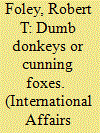

|
|
|
|
|
| Publication |
2014.
|
| Summary/Abstract |
The idea that the armies of the First World War were incapable of learning is one of the most enduring myths of the conflict. This image of 'lions led by donkeys' has proved difficult to modify, despite the sizeable scholarly literature on the tactical, technological and organizational adaptation and innovation undergone by all armies during the war. By examining the British and German armies as learning organizations during the war, this article contributes to the growing literature on wartime adaptation and innovation, as well as the wider literature on organizational learning in wartime. It demonstrates how the organizational cultures of these two armies shaped the way in which they learned, predisposing the British army towards radical, often technological, solutions to the tactical and operational challenges of the First World War battlefield, while inclining the German army towards incremental and tactical solutions to the same problems.
|
|
|
|
|
|
|
|
|
|
|
|
|
|
|
|
|
|
|
|
|